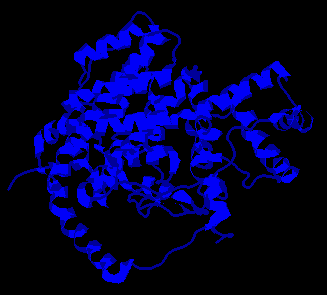 |
 |
 |
Click on the image to start downloading the PDB file (tridimensional and interactive).
Citrate condensing enzyme
Citrogenase
Oxaloacetate transacetase
3. Acyltransferases
3. Acyl groups converted into alkyl on transfer
H2O
oxaloacetate
CoA
Citrate synthase is the tricarboxylic acid cycle enzyme that catalyzes the synthesis of citrate from oxaloacetate and acetyl-CoA in an aldol condensation. CS can directly form a carbon-carbon bond in the absence of metal ion cofactors.
In prokaryotes, citrate synthase is composed of six identical subunits. In eukaryotes, there are two isozymes of citrate synthase: one is found in the mitochondrial matrix, the second is cytoplasmic. Both seem to be dimers of identical chains.
There are a number of regions of sequence similarity between prokaryotic and
eukaryotic citrate synthases. One of the best conserved contains a histidine
which is one of three residues shown to be involved in the catalytic
mechanism of the vertebrate mitochondrial enzyme. This region has been used as a
signature pattern.
Reference